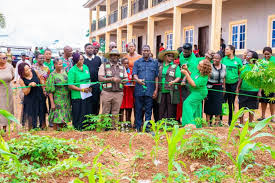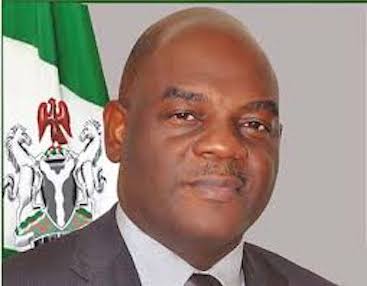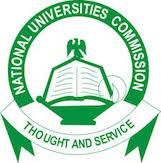Education
Tertiary Institutions Recieve N208b Grants from TETFund

From John Onah, Abuja
The Tertiary Education Trust Fund (TETFund) has begun distribution of N208 billion as allocation to tertiary institutions for 2019 intervention fund.
The Executive Secretary, TETFund, Prof Suliman Bogoro disclosed this at the annual meeting of TETFund beneficiary institutions yesterday in Abuja.
According to him, the universities got N826, 684, 392.
00, polytechnics got the sum of N566, 701, 842. 00 and Colleges of Education received N542, 226, 346.00 each.He said that 18 institutions drawn from six geopolitical zones in the country were to receive special high impact interventions.
Bogoro also explained that the 18 institutions that were critically selected in line with the provided guidelines, received N5 billion for the intervention.
He said that six universities would receive N3 billion each, six polytechnics N1 billion each and N1 billion each would go to six Colleges of Education.
TETFund boss said that the Fund had ensured that the beneficiary institutions, who are recipients of the education tax utilise them judiciously.
According to him, the agency is monitoring projects and programmes approved for them by Board of Trustees.
”The Fund had undergone some internal restructuring and realignment for better and efficient service delivery,” he said.
Bogoro said a total of 55 Colleges of Education have benefited from micro teaching laboratory, construction and furnishing.
TETFund boss added that the sum of N19, 977, 522, 916.59 had successfully been disbursed between January and June 2019 for physical infrastructure and library interventions.
He pointed out that the issue of stranded scholars abroad, which caused the nation and the fund embarrassment had been revisited promptly.
Bogoro, however, said that appropriate steps have been undertaken by the Fund to eliminate the lapses that led to the situation.
Meanwhile, Prof. Abubakar Rasheed, Executive Secretary, National Universities Commission (NUC) commended TETFund in the role played in ensuring the development of the country, especially as it concerns physical infrastructure in tertiary institutions.
Rasheed, however, said that the rising number of tertiary institutions was a challenge, which reduces interventions to the institutions.
He added that in 2019, the country has the largest number of intervention of the institution as more institutions were created.
According to him, Nigeria needs more universities, polytechnics and Colleges of Education but TETFund also needs to be protected so that the volume of intervention can be protected.
”The rising number of institutions is a challenge. Nigeria needs more institutions of tertiary education to provide more access to quality education.
”However, TETFund is also worry that with many institutions, the value of its intervention is minimised,” he said.
Rasheed, therefore, called on administrators of the various institutions to efficiently and successfully administer the funds while also urging them to be proactive in the processing of the fund.
He also called on Chief Executives of the institutions to engage other officials in their various institutions on utilisation of the fund.
It would be recalled that President Muhammadu Buhari approved N161 billion for varsities, others as 2018 Tertiary Education Trust Fund (TETFund) intervention budget for 2019 intervention activities in accordance with the provisions of TETFund Act 2011.
Each public university in Nigeria got an allocation of N785,832,700; Polytechnic gets N536,703,502; and College of Education will get N510,084,900.
Education
FG Denies Slash in Students’ Allowances

The Federal Government says it has no plan to slash scholarship students’ allowances as recently projected in the media.The Minister of Education, Prof. Tahir Mamman, stated this during a meeting with the leadership of the National Association of Nigerian Students (NANS) in Abuja on Friday.
Report says that there was a report that the ministry, through the Federal Scholarship Board, announced a slash in allowances of foreign scholars stranded in Russia, Morocco, and Algeria among others.
The slash in scholars’ allowances under the federal government’s Bilateral Educational Agreement Scholarship (BEA) was attributed to the economic crises.Mamman said that there was no slash in scholars` allowances but rather an adjustment due to Foreign Exchange fluctuations (FOREX).“We want to clarify what has been in the media on allowances paid to scholars under the Bilateral Scholarship Agreement.“We want to place it on record that the ministry and the Federal Government for that matter have not slashed the allowances due to students.“What happened is some adjustments in the amount due to them because of FOREX fluctuations, and as soon as we get the balance we have applied for, we will pay them.“But for now, what is in the budget is what we can pay. So, there is no slash, we will even be happy to increase, so this is what has led to the adjustments,” he said.(NAN)Education
Minister Unveils Fed Education Sector Games Mascot Scheduled for Bauchi

By Tony Obiechina, Abuja
Ahead of the Federal Education Sector Games (FEDUGAM) slated for Bauchi, the Federal Ministry of Education has unveiled the mascot for the 4th edition named “FEDUGAM-Bauchi 2024,” at a ceremony held in Abuja.
Speaking during the unveiling, the Minister of Education, Prof.
Tahir Mamman, represented by the Minister of State, Dr. Tanko Yusuf Sununu, expressed profound gratitude to attendees for their unwavering support and dedication to advancing the education sector.In a statement by the Director Press and PR, Folasade Boriowo, the Minister noted that FEDUGAM serves as a cornerstone for fostering camaraderie, sportsmanship, and community spirit among educators, administrators, students, and staff.
“The newly unveiled mascot embodies the values of physical fitness, teamwork, perseverance, and fair play, and is set to inspire participants throughout the games” the statement stated
Mrs. Didi Walson-Jack, Permanent Secretary of the Federal Ministry of Education, reiterated the importance of the games in promoting unity, friendship, fitness, and mental alertness among the Ministry and Agency staff.
She expressed gratitude to everyone involved in organizing the event and encouraged participants to compete with integrity and enjoy the games.
Chairman of the FEDUGAM Steering Committee, Omotayo F. Adeyemi, welcomed attendees and thanked the Minister and other dignitaries for their presence despite their busy schedule.
He harped on the mascot’s significance in representing the spirit of the games and thanked the organizing committee for their relentless efforts.
Adeyemi called for widespread support from ministries, agencies, corporate organizations, and partners to ensure the success of FEDUGAM Bauchi 2024.
FEDUGAM Bauchi 2024 is scheduled to take place from August 3-10, 2024, at the Abubakar Tafawa Balewa Stadium in Bauchi State.
The event aims to celebrate educational achievements and foster unity within the sector, with the Executive Governor of Bauchi State, His Excellency Sen. Bala Abdulkadir Mohammed, graciously hosting and supporting the event.
“As the games approach, the entire Ministry stands united in support, echoing the spirit of the mascot unveiled today. Let us come together to celebrate our shared achievements and work towards a brighter future for our education sector,” the statement added.
Education
ENSUBEB Executive Chairman Flags-off Agric Education Training

From Sylvia Udegbunam, Enugu
The Executive Chairman of Enugu State Universal Basic Education Board (ENSUBEB), Associate Professor Hyginus Banko Okibe has flagged off the 2022/2023 Agricultural Education training programme for head teachers, teachers, and pupils at Independence Layout Primary School, Enugu.
Professor Okibe emphasized the importance of agriculture for economic development and growth, stressing that the country’s major problem is hunger due to people not engaging in farming activities anymore.
He noted that schools should be exposed to agricultural skills and technology; he however announced that there will be an agricultural trade fair, where produce from all schools will be showcased.
The Commissioner for Agriculture and Agro Industrialisation, Dr. Patrick Nwabueze Ubru, in a keynote address, highlight the importance of agriculture, stating that without it, there will be no life.
He disclosed that 12,000 bags of fertiliser will be distributed to registered farmers in the state and noting that non-farmers will not receive farming inputs and fertilisers.
Ubru reiterated that agriculture occupies an important space in the Governor’s vision and manifesto as one of the developmental areas for reviving the economy.
He said that Enugu State has introduced dry season farming with solar pumping machines and embarked on three-cycle rice production, making it the largest producer of cassava in the country.
He further disclosed plans to establish agricultural processing industries in the three senatorial zones of the state.
Dr. Amaka S. Ngene, Executive Chairman of STVSMB and former Permanent Member of ENSUBEB, appreciated the guests and emphasized that the agricultural education training programme is child-centered, aimed at making agriculture a future career or hobby for the pupils.
She enumerated the objectives of the training, including the provision of requisite skills for self-employment.
Hon. Nwakaego Ajah, Permanent Member 3, thanked the Executive Governor of Enugu State, the Executive Chairman of ENSUBEB, and UBEC for the initiative in making Agricultural Science more practical-oriented at the Basic Schools.
She urged the learners and teachers to take the training serious and also promote their dignity in labour.
The event featured lectures on food crops, planting, and care, and the distribution of farm inputs and plants to various schools.
The highlight of the occasion was the decoration of Dr. Amaka Ngene by the Commissioner for Agriculture and Agro Industrialisation.

















